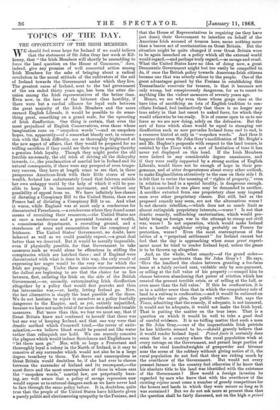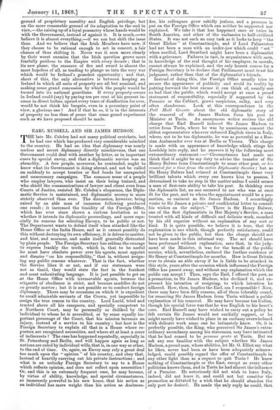TOPICS OF THE DAY.
THE OPPORTUNITY OF THE IRISH MEMBERS.
WE should feel some hope for Ireland if we could believe that the statement of Sir John Gray last week at Kil- kenny, that "the Irish Members will shortly be assembling to force the land question on the House of Commons," does, indeed, give any promise of well concerted action among Irish Members for the sake of bringing about a radical revolution in the moral attitude of the cultivators of the soil of Ireland towards the Government under which they live. The greatest curse of Ireland, next to the bad government of the era ended thirty years ago, has been the utter dis- union among the Irish representatives of the better time. Even now, in the face of the bitterest class hostility, if there were but a cordial alliance for loyal ends between the great majority of the Irish Members and the more earnest English Liberals, it would be possible to do some- thing great, something on a grand scale, for the uprooting of Irish disaffection. One thing is certain, that even the most prejudiced of English Conservatives, even those whose imagination runs on "unspoken words "—and on unspoken hopes, too, apparently—of a somewhat bloody sort, in connec- tion with the Irish difficulty, are so thoroughly frightened at the new aspect of affairs, that they would be prepared for no trifling sacrifices if they could see their way to gaining thereby a genuine Irish loyalty. Though they might prefer the old forcible no-remedy, the old trick of driving all the disloyalty inwards, i.e., the proclamation of martial law in Ireland and its natural consequents, if there were any prospect of even tempo- rary success, they have at length come to see that, in these prosperous American-Irish with their little stores of new wealth, Ireland has unfortunately found that fulcrum outside her own unhappy world by the help of which it will be pos- sible to keep it in incessant movement, and without any possibility of appeal from us. We have infinitely less chance of dictating a Conspiracy Bill to the United States, than ever France had of dictating a Conspiracy Bill to us. And what is worse, while England was at most only a rendezvous for discontented Frenchmen,—a rendezvous where they found scant means of recruiting their resources,—the United States are at once a rendezvous and a perennial fountain of wealth, a commissariat department, a recruiting ground, and a storehouse of arms and ammunition for the conspiracy of Irishmen. The United States' Government, no doubt, have behaved as well as we could possibly expect,—a great deal better than we deserved. But it would be morally impossible, even if physically possible, for that Government to take measures such as would alone be efficacious in stifling the conspiracies which are hatched there ; and if England were discontented with what is done in this way, the only result of expressing her anger would be the very war for which the Irish are praying. Under these ominous circumstances even the dullest are beginning to see that the choice for us lies between, first, enlisting the Irish on the side of the British Government,—or, secondly, exterminating Irish disaffection altogether by a policy that would first provoke and then fan internecine war,—or, lastly, letting Ireland go. Now, the last alternative is simply the least possible of the three. We do not hesitate to reject it ourselves as a policy fearfully dangerous to the Empire, and, as yet, entirely unjustified, because we have not made trial of far more desirable and tenable measures. But more than this, we fear we must say, that if Great Britain knew and confessed to herself that there was but one way of keeping Ireland, and that one way were that drastic method which Cromwell tried,—the terror of extir- mination,—we believe blood would be poured out like water rather than relinquish our hold. We can scarcely conceive the plagues which would induce Scotchmen and Englishmen to "let these men go." Nor, with so large a Protestant and thoroughly loyal a colony in the North of Ireland, is it easy to conceive of any surrender which would not also be in a large degree treachery to them. Yet fierce and unscrupulous as Great Britain would doubtless be, if she had ever to choose between the surrender of Ireland and its reconquest,—the most fierce and the most unscrupulous of those in whose ears the "unspoken words," martial law, are perpetually buzz- ing, are well aware that a policy of savage repression now would expose us to external dangers such as we have never had to face through the same policy before. It is, doubtless, quite true that the people of the United States have hitherto given a purely politic and electioneering sympathy to the Fenians, and that the House of Representatives in requiring (as they have just done) their Government to interfere on behalf of the American Irish accused of treason here, mean nothing more than a barren act of recrimination on Great Britain. But the situation might be quite changed if ever Great Britain were to be again launched on a policy which all the external world_ would regard,—and perhaps truly regard,—as savage and cruel. What the United States have no idea of doing now, a great Democratic Government might but too easily be compelled to- do, if once the British policy towards American-Irish citizens became one that was utterly odious to the people. One of the great advantages gained by the Fenians in establishing this. Transatlantic reservoir for treason, is that it becomes not only wrong, but conspicuously dangerous, for us to resort to, anything like the violent measures of seventy years ago. Hence, we see why even those whose gorge rises at the bare idea of sacrificing an iota of English tradition to con- ciliate Ireland, feel instinctively that there is no longer any true safety in that last resort to naked force, for which they would otherwise be too ready. It is of course open to us to use force as we are now doing, solely on the defensive. But the sort of force which alone would be equal to stamping out- disaffection such as now pervades Ireland from end to end, is. a resource hinted at only in "unspoken words." And thus it happens that even Sir John Gray's modification of Mr. Bright's and Mr. Hughes's proposals with respect to the land tenure, is- resisted by the Times with a sort of hesitation of tone it has. neveryet displayed on this head. If the Irish Members. were indeed in any considerable degree unanimous, and_ if they were really supported by a strong section of English Liberals, would there not be enough of hope in their pro- gramme, and of utter desperateness about every other outlook,. to make England listen attentively to the case on their side ? It is felt that to revise the meaning of "rights of property," even, in relation to land in a special locality, is dangerous enough. What is conceded in one place may be demanded in another.. A sacrifice extorted from one proprietary class may impend soon over other proprietary classes. But still, bad as the proposed remedy may seem, are not the alternatives worse ? Is not chronic rebellion,—which does not so much limit as almost extinguish proprietary interests,—worse ? Is not that drastic remedy, unffinching cauterization, which would pro- bably bring on foreign war in the attempt to stamp out civil war, worse ? Is not separation, which would make Ireland. into a hostile neighbour relying probably on France for protection, worse? Even the most contemptuous of the critics of a "perpetual settlement" for Ireland cannot but feel that the day is approaching when some great experi- ment must be tried to render Ireland loyal, unless the game is to be thrown up altogether.
And, on the whole, what remedy—of the grand order— could be more moderate than Sir John Gray s ? He says, Give the landlord the choice between granting a fee-farm lease at a fairly revised rent, voidable only by non-payment, or selling at the full value of his property :—compel him to choose between abandoning that power of eviction which has created the present terrible crisis, or of selling at the full, or even more than the full value.' If this be confiscation, it is so in a milder sense than that in which the compulsory sale of land to a railway is confiscation,—and it would be enforced on precisely the same plea, the public welfare. But, says the Times, admitting that the remedy, if adequate, is not immoral, it would not be adequate, it would not make the Irish loyal.. That is putting the matter on the true issue. That is a question on which it would be well to take a good deal of careful evidence. It is no trifling matter that such a man as Sir John Gray,—one of the impracticable Irish patriots he has hitherto seemed to be,—should gravely believe that it would render Ireland loyal. Prima' facie it certainly does seem that in a country where the rural population wink at every outrage on the Government, and permit large parties of rebels to steal hundredweights of gunpowder and bivouac near the scene of the robbery without giving notice of it, the rural population do not feel that they are risking much by the overthrow of the Government. But would not every peasant farmer in the country feel otherwise if he knew that his absolute title to his land was identified with the existence of the Government ? How would a foreign invasion be regarded by men who knew that with the overthrow of the existing re'gime must come a number of greedy competitors for the homes and lands in which they were secure so long as it was sustained V But we do not ask more at present than that the question shall be fairly discussed, not on the high a priori ground of proprietary morality and English privilege, but on the more reasonable ground of its adaptation to the end in Nriew,—the raising up of a loyal peasantry whose hands would be with the Government, instead of against it. It is much,—we 'believe it is almost everything,—if we can but shift the issue -thus. And we believe that the Irish Members have now, if they choose to be rational enough to act in concert, a fair .chance of thus shifting it. Never was it seen more clearly by their worst enemies that the Irish question grows more fearfully perilous to the Empire with every decade ; that in its new phase, the resource of fire and sword is almost the most hopeless of all, as tending to plunge us into the very war which would be Ireland's grandest opportunity ; and that, short of this, the only alternative is between keeping an Ireland in which all sorts of property are all but nominal, and -making some grand concession by which the people would be turned into its national guardians. If every property-owner in Ireland could (say) by paying ten per cent of his present in- come in direct bribes, uproot every trace of disaffection for ever, would he not think his bargain, even in a pecuniary point of wiew, a glorious one ? And if that be so, it is in the interests -of property no less than of peace that some grand experiment such as we have proposed should be made.































 Previous page
Previous page